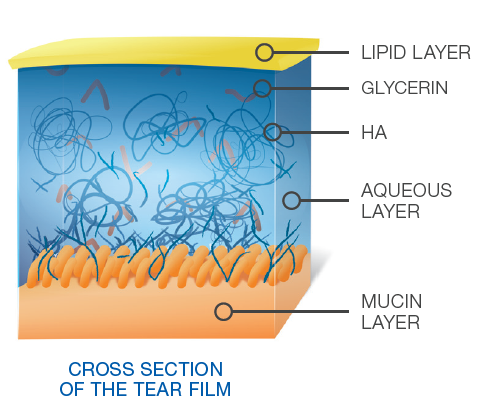Dry Eye - a new approach
Dry Eye Disease is a chronic, or long term condition which can cause ongoing discomfort, poor vision and at its worst serious permanent damage to the eyes. With our current lifestyle and environment, it is also a condition which we are encountering more and more often.
Dry Eye is perhaps a poor name for a multi-factor condition, there may be not enough tears present, or the tears could be of a poor constitution with too much oil or protein in them. At times we can even have too much tears, but they are watery and not very good at lubricating the eyes.
Surely tears are just tears?
Tears are a very complex structure:
They are designed to ensure the front surface of the eye is properly hydrated, protected from infection, environmental irritants and foreign bodies. They are essential for good vision, when light enters the eye the tear film is the first layer that it must go through. A poor quality tear film will interfere with our overall quality of vision, just think how bad it is to look through a car's windshield when it is smeared with greasy/muddy water.
In the past all we could really recommend to alleviate this condition was artificial tears to lubricate the eyes. With continuing understanding of the tear film and the factors that affect it, though, we are now much better able to look at the causes of tear film and ocular surface issues and recommend personal regimes to restore balance to them.
Proper diagnosis is key.
Our TFOS (Tear Film and Ocular Surface) appointments will gather many different assessments of the eye, including the volume and osmolarity (saltiness) of the tear film.
Establishing baseline measurements and creating personal wellbeing programs ensures that as the condition is brought under control, not only does vision and comfort improve, but we can appropriately measure the success of the different steps that we take.
Dr. Euan McGinty and Dr. John Wilson have undertaken hours of specific training and education in this field to ensure that they are able to offer appropriate advice and care. To book a TFOS assessment, please contact our office for an appointment.



